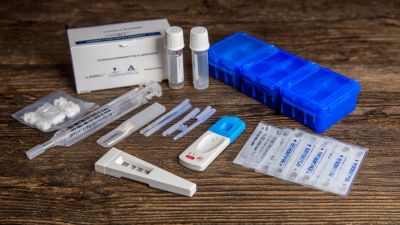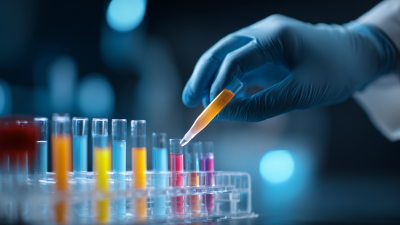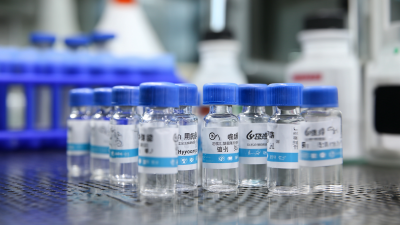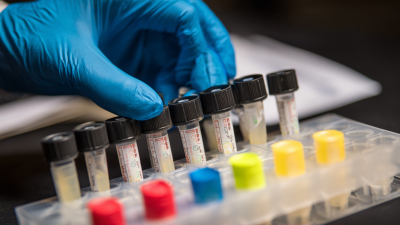How to Effectively Use Ns1 Dengue Test Kit for Accurate Dengue Diagnosis
Table of Contents
- Understanding the Ns1 Dengue Test Kit and Its Purpose
- Preparing for the Ns1 Dengue Test: Essential Steps to Follow
- Administering the Ns1 Dengue Test: A Step-by-Step Guide
- Interpreting Results: How to Analyze Ns1 Dengue Test Outcomes
- Best Practices for Accurate and Reliable Dengue Diagnosis Using Ns1
- Comprehensive Guide to HCV Ab Test Kit: Importance, Usage, and FAQs
- FAQS
- Conclusion
- Related Posts
Dengue fever is a viral illness spread by mosquitoes, and it’s a pretty big public health issue around the world. The World Health Organization estimates there are about 390 million cases each year—that’s a huge number! Getting an accurate and quick diagnosis is super important to managing the disease properly. That’s where the NS1 Dengue Test Kit really comes in—it's a game-changer because it gives fast results, helping doctors make better decisions more quickly. Jiangsu Macro & Micro-Test Med-Tech Co., Ltd., started back in 2010 in Beijing, focusing on improving diagnostic tools. They’re really into researching, developing, and producing cutting-edge in vitro diagnostic reagents, all backed by solid manufacturing skills to ensure top-quality products. With this test kit, healthcare providers can spot dengue infections more reliably, which means better treatment for patients and a stronger push forward in the global fight against dengue fever.

Understanding the Ns1 Dengue Test Kit and Its Purpose
The Ns1 Dengue Test Kit is a handy tool that's designed to give quick and reliable results when diagnosing dengue fever—a viral illness you catch from mosquitoes. It’s especially helpful in the early days when you’re just starting to notice symptoms. Knowing what this test does is pretty important, whether you’re a healthcare pro or just someone trying to keep an eye on their health, because catching dengue early can make a big difference in treatment and help avoid complications.
If you're using the Ns1 Dengue Test Kit, here are a few tips to make sure you get the most accurate results. First off, make sure you're collecting the sample properly—messing that up can lead to false readings. Follow the manufacturer’s instructions about how much sample to use and how to store it. It’s also best to perform the test in a clean, controlled space to avoid contamination or mistakes. And finally, don’t just rely on the test results—compare them with the symptoms you’re experiencing and your medical history. That way, you’ll get a clearer picture.
This test isn’t just for diagnosis—it’s also useful for keeping an eye on how the disease is progressing. Just keep in mind, a negative result doesn’t entirely rule out dengue, especially if symptoms are still present. So, healthcare providers should take a comprehensive approach—using clinical exams and patient history along with the test—to manage dengue effectively.
Preparing for the Ns1 Dengue Test: Essential Steps to Follow
When you're getting ready to take the Ns1 Dengue Test, there are a few key things to keep in mind to make sure the results are as accurate as possible.
First off, healthcare providers really need to understand the whole patient journey in dengue management. That means recognizing symptoms, knowing if the patient has been exposed, and being mindful of when to do the test — because testing too early can sometimes give a false negative.
It’s a balancing act, really, selecting the right timing and patients for testing.
Leveraging digital health tools can make this whole process a lot smoother.
These tools help doctors and nurses make smarter decisions and manage patients better.
And some of the coolest tech coming out of Jiangsu Macro & Micro-Test Med-Tech Co., Ltd. really makes a difference here.
They’re always pushing the envelope with new detection technologies, which means clinicians get access to reliable in vitro diagnostic reagents — ultimately leading to quicker, more accurate dengue diagnoses.
As public health challenges keep growing, tapping into these latest advancements is more important than ever to improve how we handle dengue cases.

Administering the Ns1 Dengue Test: A Step-by-Step Guide
adminstering the NS1 Dengue Test is pretty crucial when you're trying to figure out if someone has dengue, especially if cases are really picking up in the area. So, the NS1 antigen test basically looks for that non-structural protein NS1, which gets released into the blood during a dengue infection. To get the best results, it's smart to understand what symptoms to look for—things like a high fever, a really bad headache, and joint pains are common. Oh, and timing is key! It’s most accurate when done within the first few days after symptoms start showing.
When you're actually doing the test, make sure you've got all your equipment ready and that everything’s sterilized—no cutting corners here. Then, draw the patient's blood using standard vein-puncture methods. After that, follow the test kit instructions carefully to process the sample. Once you've run the test, don’t wait too long to look at the results. If it’s positive, that pretty much means they’re actively infected with dengue and will probably need some more medical attention. If it’s negative but they’re still feeling lousy, it might be worth running additional tests, just to be sure. Also, keeping an eye on local dengue outbreaks can help you decide when to test and what precautions to take for your patients or community.
How to Effectively Use Ns1 Dengue Test Kit for Accurate Dengue Diagnosis
| Step | Description | Time Required | Expected Result |
|---|---|---|---|
| 1 | Prepare the test environment, ensuring cleanliness and organization. | 5 minutes | Clean and safe workspace |
| 2 | Collect the blood sample from the patient using proper techniques. | 10 minutes | Valid blood sample |
| 3 | Add the blood sample to the NS1 dengue test kit as directed. | 2 minutes | Appropriate sample addition |
| 4 | Wait for the specified time to develop the results. | 15 minutes | Result development |
| 5 | Interpret the results based on the control line and test line. | 3 minutes | Positive, negative, or invalid result |
Interpreting Results: How to Analyze Ns1 Dengue Test Outcomes
When you're using the Ns1 dengue test kit, getting the results right is super important for a proper diagnosis and treatment plan. Usually, you'll see one of three things: positive, negative, or indeterminate. If it's positive, that's a good sign you might have dengue, especially if you're also dealing with symptoms like fever and joint pain. On the other hand, a negative result probably means dengue isn’t there, but keep in mind that when you take the test matters — testing too early might lead to a false negative because the virus just isn't detectable yet.

A couple of tips? First off, make sure you're following the manufacturer's instructions carefully — skipping steps or rushing through might mess with your results. If you get an indeterminate result, it's a smart move to retake the test or have more tests done. Also, pay attention to your symptoms and how they change — this info can really help your doctor understand what's going on when they interpret the test results.
At the end of the day, it’s not just about the test result alone; you and your healthcare provider should look at it alongside your symptoms and medical history. If the test hits positive, doctors usually suggest doing additional serological tests to confirm it and see how far along the infection might be. Getting the interpretation right and acting promptly can really make a difference in how your recovery unfolds.
Best Practices for Accurate and Reliable Dengue Diagnosis Using Ns1
Lately, the NS1 Dengue Test Kits have become pretty popular, mainly because they’re pretty effective at catching dengue infections early on. Getting an accurate diagnosis during that crucial viremia window is super important so that treatment can start right away. A lot of studies show that the NS1 antigen can actually be detected during the acute phase of dengue fever, making these kits a really valuable tool for healthcare workers. For example, research done in Dhaka, Bangladesh, tested out several quick detection kits and found that the NS1 antigen was a dependable marker — with sensitivity rates hitting between 80% and 90% in early detection cases.
If you’re using the NS1 Dengue Test Kit, a few best practices can help you get better results. For one, make sure you’re collecting samples properly and following the manufacturer’s instructions—that’s key. Also, performing the test within the recommended time frame after symptoms start really boosts accuracy. Plus, combining the NS1 test with testing for IgM and IgG antibodies can make things even more reliable, especially in places where dengue and other flaviviruses like Zika or West Nile are both around. As dengue testing technology keeps evolving, it’s important to keep evaluating these rapid tests so healthcare providers can stay ahead and improve patient care more effectively.
Comprehensive Guide to HCV Ab Test Kit: Importance, Usage, and FAQs
The HCV Ab test kit is an essential tool for the qualitative detection of hepatitis C virus (HCV) antibodies in human serum or plasma. This in vitro diagnostic kit plays a crucial role in the auxiliary diagnosis for patients suspected of HCV infection, particularly in regions with high prevalence rates. By identifying the presence of HCV antibodies, healthcare professionals can make informed decisions about further testing and treatment, leading to better patient outcomes.
In addition to its diagnostic applications, the HCV Ab test kit is invaluable for screening purposes in populations at higher risk of infection. Early detection of HCV antibodies allows for timely intervention, reducing the likelihood of chronic infection and its associated complications. As awareness about hepatitis C grows, utilizing tools such as the HCV Ab test kit becomes increasingly important in public health strategies aimed at controlling this viral disease. With its straightforward operation and reliable results, this kit serves as a frontline resource in the fight against HCV.
FAQS
: The Ns1 Dengue Test Kit is designed for the rapid and accurate diagnosis of dengue fever, particularly useful in the early stages of the illness to improve treatment outcomes and reduce complications.
The test should be performed within the first few days of symptom onset, such as high fever, severe headache, and joint pain, for the most accurate results.
To ensure accuracy, correctly collect the sample, adhere to the manufacturer's guidelines for sample handling, perform the test in a controlled environment, and cross-verify results with clinical symptoms and medical history.
A positive NS1 test result indicates an active dengue infection and necessitates further medical evaluation.
If the NS1 test result is negative but clinical symptoms persist, additional testing may be required as negative results do not rule out dengue fever.
Recognizing the limitations is important because negative results do not eliminate the possibility of dengue if symptoms are present; a comprehensive approach including clinical evaluation is essential for effective management.
Ensure that a sterile environment is maintained to avoid contamination and follow standard procedures for blood sample collection.
The Ns1 Dengue Test aids in monitoring the progression of dengue fever, allowing healthcare providers to adjust treatment as needed based on the test results and clinical assessment.
Yes, the Ns1 Dengue Test is critical in areas experiencing surges in dengue cases, as it helps in the timely diagnosis and management of the disease.
Necessary equipment includes the test kit itself, sterile blood collection materials, and any additional tools needed for processing the sample as per the kit instructions.
Conclusion
The Ns1 Dengue Test Kit is a really important tool when it comes to diagnosing dengue accurately. It works by detecting the NS1 antigen in patients, which is especially handy during those early days of infection when symptoms can be pretty vague or confusing. To get the best results, it's super important to understand what the kit is for and to follow the right steps for preparation. The testing process itself is straightforward—kind of like a simple step-by-step guide that makes sure everything’s reliable and efficient.
Getting the results right really matters because it directly impacts what kind of treatment the patient will get. The article points out some best practices for performing the test properly, so you can trust the outcomes. That way, healthcare professionals can make smarter decisions when it comes to managing dengue. At Macro & Micro Test, they’re all about pushing the boundaries with new diagnostic tech, and supporting tools like the Ns1 Dengue Test Kit is part of their goal to improve healthcare diagnostics everywhere.
Related Posts
-

What You Need to Know About Wholesale Hepatitis B Rapid Test Kit Manufacturers
-

Innovative Solutions for Accurate Helicobacter Pylori Antigen Detection in Gastrointestinal Health
-

5 Unforgettable Reasons to Choose the H1N1 Real Time PCR Kit for Accurate Testing
-

Discover Top-Quality Hpylori Test Solutions from Premier Chinese Manufacturers
-

How to Determine the Best GBS Price for Your Business Needs
-

Ultimate Guide to Understanding Duo Dengue Ag Igg Igm Rapid Test for Accurate Diagnosis


